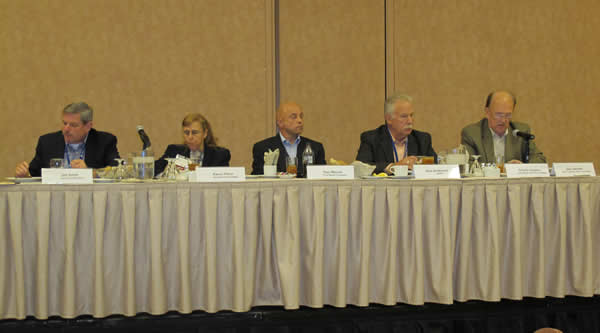A representative of an OEM and several representatives of the aftermarket debated whether certification of aftermarket crash parts is the best policy for consumers and repairers at a Town Hall at NACE Oct. 13.
Panel participants included: Jim Smith of JSE Group LLC (Diamond Standard); Karen Fierst of KerenOr Consultants; Paul Massie of Ford Motor Company; Bob Anderson of Anderson’s Automotive Service; and Charlie Hogarty of the Automotive Body Parts Association. The moderator of the panel discussion was Dan Stander of Jerry Stander’s Collision Works, who also serves as director of the ASA Collision Division.
Anderson, who serves as chairman of the Certified Automotive Parts Association’s (CAPA) Board of Directors, spoke from the perspective of a shop owner faced with daily parts challenges.
“As a ‘hands-on’ shop owner, I know what it means to have to deal with a poor quality part. As former chair of ASA, I heard from shops around the country, and the top shops said that they simply can’t afford to deal with problem parts,” said Anderson. “In the early days when I would hear about CAPA parts, I had no idea that they were any different than non-certified parts. It wasn’t until I did my own research that I discovered the real standards behind the CAPA Quality Seal. Had I not taken the time to do that, I would have continued to believe that all aftermarket parts are the same. Now, I know that’s simply not true.
“My problem is that about 80 percent of the aftermarket parts available to me are not CAPA certified. As a result, it’s hard to find them. I’ve learned that the only way to tell if the part is a genuine CAPA part is to look for the yellow-and-blue seal.”
The group also talked about NSF International’s announcement earlier that week of a new aftermarket collision parts distributor certification program for traceability and recall. It was emphasized that NSF is a complement to CAPA, it isn’t funded by insurers, it doesn’t solicit insurer input and that the Society of Collision Repair Specialists participated in the standards writing process for sheet metal parts, plastic parts and lights. Also, those standards are ANSI-approved.
“This is a good thing, if only because this has been talked about for 20 years and it’s finally happening,” said Karen Fierst, a former consultant for the Taiwan Auto Body Parts Association.
Eileen Sottile of the Quality Parts Coalition asked Paul Massie, powertrain and collision product marketing manager for Ford, why the automakers insist that variances in aftermarket parts are unacceptable yet allow for a range of acceptable variances in their own parts – in reference to recent research by Diamond Standard, LLC.
“Car company replacement parts are often manufactured using different materials than the original production parts, or even from the same replacement parts depending on the year, the lot, the manufacturer, etc., and yet the car companies assume that all of their replacement parts, regardless of the composition, will perform adequately, if not the same,” Sottile said.
“Ford’s repair parts are designed to meet government and internal safety requirements that apply to original production parts,” said Massie. “Ford’s surface and structural parts used to return the vehicle to pre-accident condition (i.e. sheet metal, bumpers, lighting, mirrors, structural parts, etc.) are the same used for production vehicles. We also provide extensive repair materials to body shops to help ensure key safety systems are repaired to original condition.”
More information:
Diamond Standard Says Study Indicates ‘Acceptable Variance’ Among Parts Exists
Ford Unveils Results of Crash Part Testing at CIC














